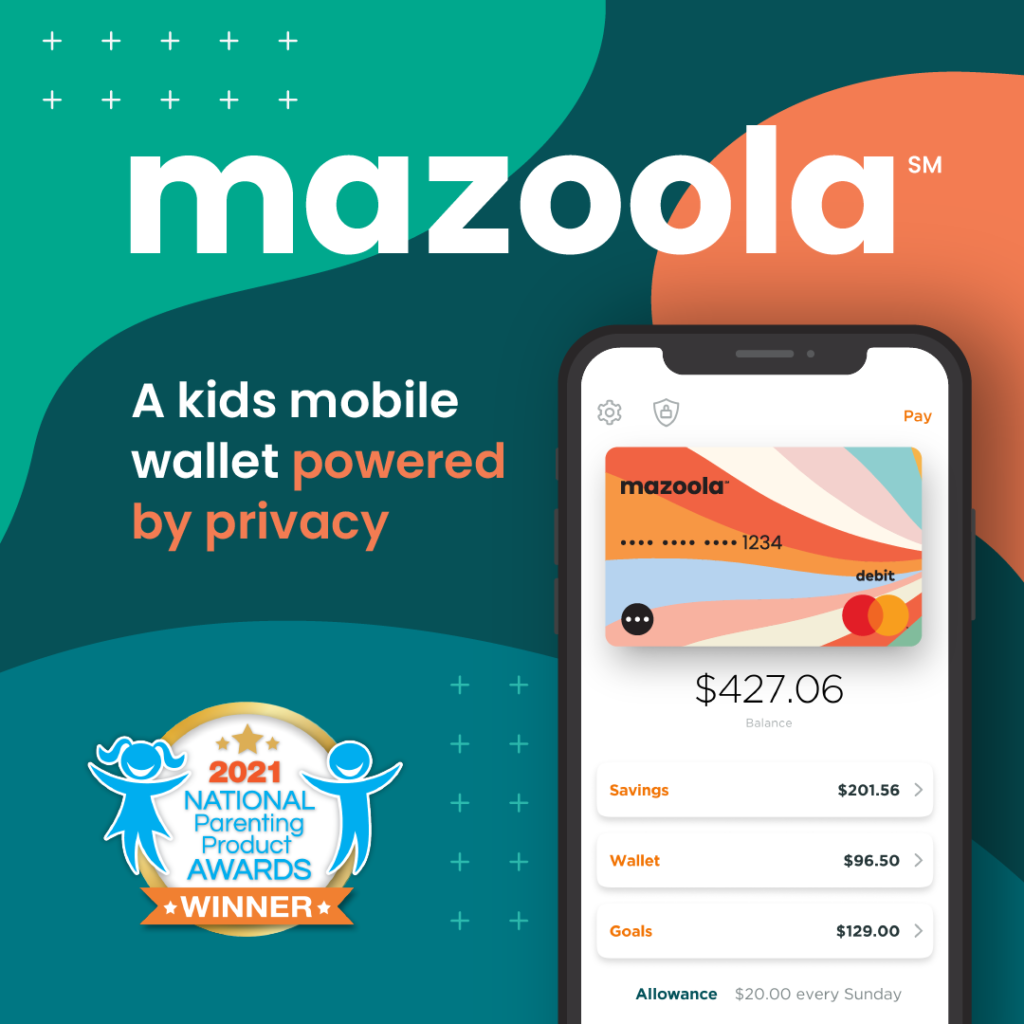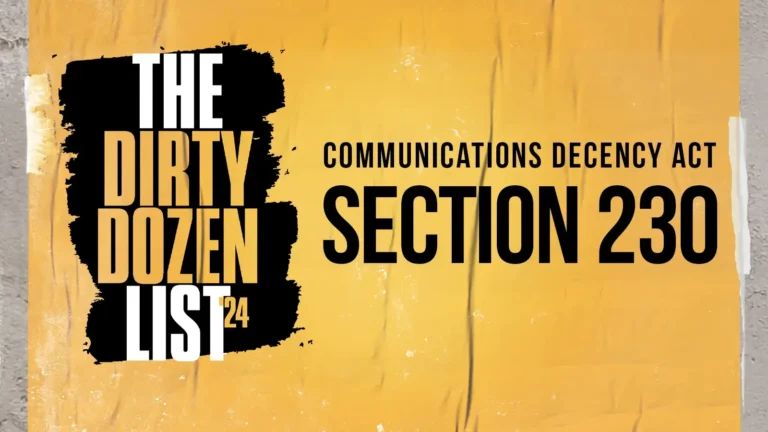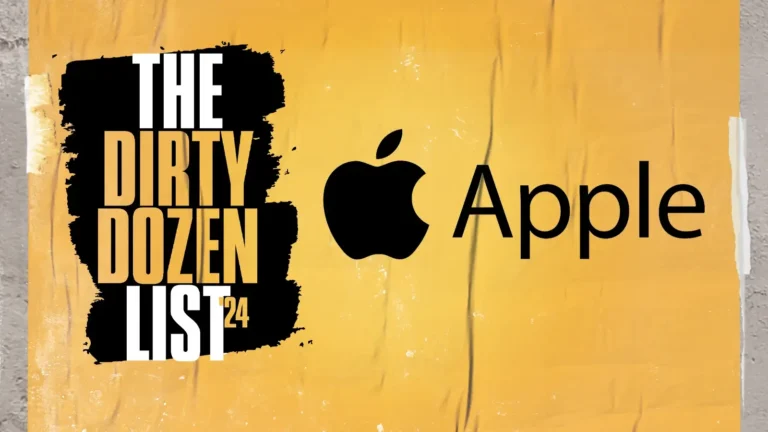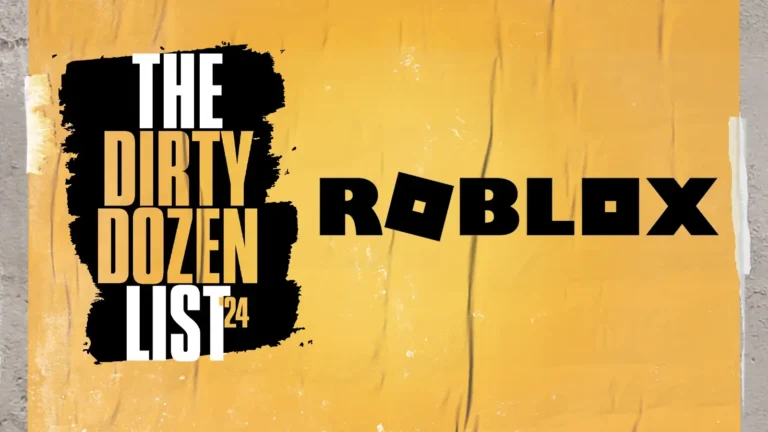Payment apps and online payment options through social media platforms are used to enable child and adult sexual exploitation. These digital payment options give easier access to sexual predators to groom young users. Direct service providers serving child sex trafficking victims have called NCOSE to ask our assistance in advocating that Square, CashApp, and Venmo make changes to their platforms to reduce the ease with which predators can send money to young kids. Georgia First Lady Marty Kemp and online child safety group Bark have found similar trends—predators using these online payment systems to groom and exploit children.
Child sex trafficking survivors have shown NCOSE their phones, explaining that $50 would suddenly show up in their account and they would know their sex trafficker just sold them to a sex buyer.
NCOSE listed Snapchat on the 2017 Dirty Dozen List in large part due to their app feature Snapcash, which was largely used to pay for filmed and in-person sex acts, including those with children. Gratefully, Snapchat disabled the feature, however the trend continues with the #snapcash hashtag still in-use, and Venmo and Square increasingly used as the payment processor. While Instagram remains a hotspot for grooming and soliciting sex from youth, the platform recently announced an upcoming subscription feature (just like exploitative OnlyFans) enabling users to pay and receive money for content on their platform, which is likely to be abused by child predators (we are already in talks with them to ensure exploitation remains prohibited).
In addition to the ease with which online payments are given and received directly to youth to facilitate child sexual exploitation, predators are also known to track the behavior of youth online and then use that knowledge to push kids to do what they want. The lack of privacy for youth online is deeply troubling. This is why our public policy team is advocating to raise the digital age of adulthood from the current 13 to 18 with legislation pending before Congress. Take action below.
In light of these increasing dangers facing youth online, we are especially excited about a new tool that gives parents “digital superpowers” to help navigate their child’s path to earning, learning, and developing essential money management skills, while protecting their financial privacy and providing essential armor against victimization and exploitation online.
We are pleased to recognize REGO and its super app digital wallet platform, MazoolaSM with the Dignity Defense Alert!
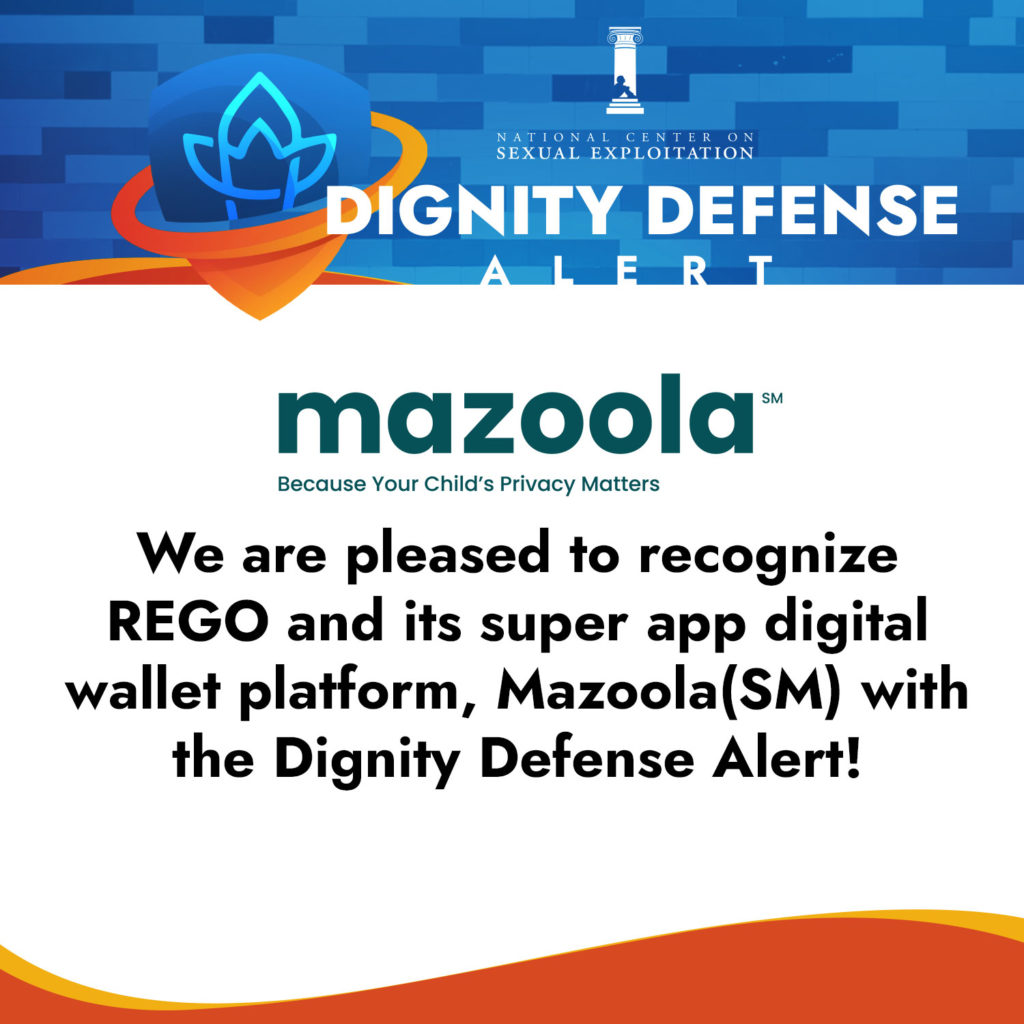
Why Mazoola is So Necessary
We all know the threat that social networking sites can pose to children and the ways predators can use data exposed on social media. However, the misuse of data collected during a child’s financial transactions online or in-person via debit cards, digital wallets, and smartcard apps can be just as damaging.
Data thieves are more likely to capitalize on kids’ data. Criminals can often open more fraudulent accounts using a child’s personal information before getting caught than when using an adult’s. In 2017, among people notified that their information was included in a data breach, 39% of minors became victims of fraud compared to only 19% of adults. Over 1 million kids are victims of identity theft each year and children are 51 times more likely to be a victim of identity theft than adults.
That kind of information is rocket fuel for abusers and predators who thrive on grooming, manipulation, and “social engineering” of young children. Personal data about a child’s online and in-person transactions would open massive new avenues to earn trust and break through child’s defenses and instincts.
The proliferation of contactless payments in the COVID-19 era continues to grow rapidly and debit cards and digital wallets are a significant tool that children can use. However, most parents are not aware of the potential threat these new financial payment mechanisms can create. For example, parents may sign up to allow their child to save or make easy, digital payments, without realizing this technology also creates an avenue for predators to anonymously transfer money into their child’s digital wallet. Services like this that don’t provide clear and easy parental visibility create unsafe spaces for children without even realizing it.
Mazoola, as the only COPPA-certified mobile family wallet, is a walled garden that offers parents much-needed reassurance that their children’s financial information is safe while shopping with their favorite retailers online or in-store from their mobile device. Parents get the immediate visibility into every one of their child’s transactions, while helping them build financial independence in a safe, step-by-step way.
A Cycle of Exploitation: Online Harms Facing Youth
The brave whistleblower Frances Haugen has shown how Facebook targets kids with harmful and toxic messages and ads, driving a cycle of exploitation and harm that has victimized thousands. Congress is rightly considering a host of reforms to create a safer, more accountable Internet—including limiting tech platforms’ overbroad Section 230 immunity and even more focused legislation like the KIDS Act that would limit online manipulation and amplification of the most destructive messages.
But overlooked in the debate is an even simpler, more immediate step legislators can take to protect our kids from technology platforms run amok—modernize and strengthen our privacy laws to cut off the data fuel that powers algorithmic abuse and exploitative microtargeting in the first place.
Right now, the federal COPPA law requires companies to get opt-in consent before collecting personal information from children who are 12 and under. But these new fintech digital wallet companies that are targeting kids, like Greenlight and goHenry, can collect personal data from all children at will unless their parents affirmatively “opt-out”—which often requires running an obstacle course of click-throughs and consent forms that even a determined adult would have trouble navigating. Obviously, very few parents have opted their kids out.
The resulting FinTech Child Privacy Protection (FTCPP) gap is bad enough when our kids are just surfing the web or uploading their personal information to TikTok. But the harm gets supercharged when kids start using non-COPPA compliant payment apps and digital wallets.
Children’s Privacy is Not Prioritized
A recent VICE investigation found the largest kid-targeting payment companies “are willfully stretching the bounds of the Federal Trade Commission’s rules” and reserve the right to collect and share “a shocking amount of data” about our kids—including “names, birthdates, email addresses, GPS location history, purchase history, and behavioral profiles.” The power to collect and sell the individual financial transaction history of a child to data brokers, which can then be aggregated and combined with the broader universe of data collected on that child from the rest of their online activity poses a clear and present danger to our kids.
Which brings us right back to the Facebook Files—and the risk that all this personal information will end up feeding the abusive ad targeting and addictive engagement tools that are causing so much damage to our kids online. A teenager who buys diet soda or starts visiting the gym shouldn’t find themselves bombarded with manipulative ads and sponsored influencer content promoting extreme weight loss or other unhealthy messages about body image and their lives. Access to this kind of data (or targeting based on it) would let predators refine their approach to potential victims based on an intimate knowledge of the things they like and how they spend their money and time.
If the data were to be breached or leak onto the dark web, it would give a global community of predators an inside track to manipulate and exploit our children.
New Legislation to Improve Child Online Privacy
Senator Ed Markey, (the original author of the COPPA legislation), has proposed bi-partisan critical legislation to close the FTCPP gap—ensuring all kids younger than 16 receive full COPPA-level opt-in protections and banning certain forms of targeting and similar data abuses, and creating a digital data “eraser” button to put families in control of kids’ data. Representative Kathy Castor has also introduced landmark legislation, the Kids PRIVCY Act, to strengthen COPPA and keep children safe online.
This legislation is especially critical to strengthen the security and safety of digital wallets and spending apps, especially as we emerge from a global pandemic that has skyrocketed the use of contactless payment systems—including for in-person sales. And existing products in the market like the Mazoola payment app have already proven it’s possible to provide full COPPA-level protection to older kids and seamless digital payment online or in stores without collecting any personal data at all about children.
Moving forward with privacy legislation as the first step in addressing the crisis of weaponized data and online harm is also smart because Congress has been working on core privacy issues and developing vetted legislative proposals for years. Both Europe’s General Data Protection Regulation (GDPR) and California’s Consumer Privacy Protection Act already provide similar strong protections for younger users, offering real-world proof this path is safe and feasible.
We know a lot about the harm too much data can do in the hands of massive online platforms that do nothing. Congress must act to protect our kids.
But in the meantime, smart tech like Mazoola can protect our kids now and let them benefit from the online world without falling prey to it.
Take Action: Contact Congress
Learn more about Mazoola and whether its right for your family here: https://bit.ly/MazoolaIntro
Note: A portion of proceeds from new Mazoola sales will go towards NCOSE’s work to keep kids safe online.


